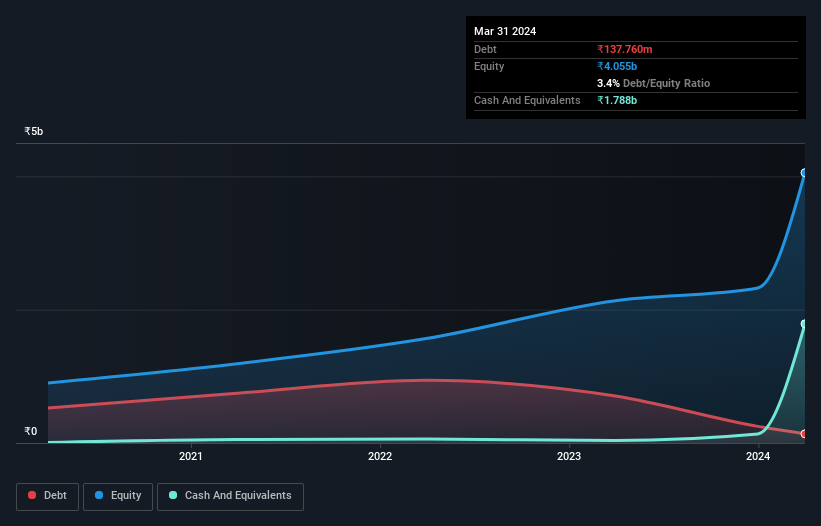We Think J.G. Chemicals (NSE:JGCHEM) Can Stay On Top Of Its Debt

The external fund manager backed by Berkshire Hathaway's Charlie Munger, Li Lu, makes no bones about it when he says 'The biggest investment risk is not the volatility of prices, but whether you will suffer a permanent loss of capital.' So it might be obvious that you need to consider debt, when you think about how risky any given stock is, because too much debt can sink a company. Importantly, J.G. Chemicals Limited (NSE:JGCHEM) does carry debt. But is this debt a concern to shareholders?
When Is Debt A Problem?
Debt and other liabilities become risky for a business when it cannot easily fulfill those obligations, either with free cash flow or by raising capital at an attractive price. Ultimately, if the company can't fulfill its legal obligations to repay debt, shareholders could walk away with nothing. However, a more common (but still painful) scenario is that it has to raise new equity capital at a low price, thus permanently diluting shareholders. Having said that, the most common situation is where a company manages its debt reasonably well - and to its own advantage. When we examine debt levels, we first consider both cash and debt levels, together.
See our latest analysis for J.G. Chemicals
What Is J.G. Chemicals's Debt?
The image below, which you can click on for greater detail, shows that J.G. Chemicals had debt of ₹137.8m at the end of March 2024, a reduction from ₹703.5m over a year. However, it does have ₹1.79b in cash offsetting this, leading to net cash of ₹1.65b.

How Strong Is J.G. Chemicals' Balance Sheet?
The latest balance sheet data shows that J.G. Chemicals had liabilities of ₹394.5m due within a year, and liabilities of ₹40.2m falling due after that. Offsetting this, it had ₹1.79b in cash and ₹1.17b in receivables that were due within 12 months. So it actually has ₹2.52b more liquid assets than total liabilities.
This excess liquidity suggests that J.G. Chemicals is taking a careful approach to debt. Given it has easily adequate short term liquidity, we don't think it will have any issues with its lenders. Succinctly put, J.G. Chemicals boasts net cash, so it's fair to say it does not have a heavy debt load!
It is just as well that J.G. Chemicals's load is not too heavy, because its EBIT was down 43% over the last year. Falling earnings (if the trend continues) could eventually make even modest debt quite risky. The balance sheet is clearly the area to focus on when you are analysing debt. But you can't view debt in total isolation; since J.G. Chemicals will need earnings to service that debt. So when considering debt, it's definitely worth looking at the earnings trend. Click here for an interactive snapshot.
But our final consideration is also important, because a company cannot pay debt with paper profits; it needs cold hard cash. While J.G. Chemicals has net cash on its balance sheet, it's still worth taking a look at its ability to convert earnings before interest and tax (EBIT) to free cash flow, to help us understand how quickly it is building (or eroding) that cash balance. Over the most recent three years, J.G. Chemicals recorded free cash flow worth 52% of its EBIT, which is around normal, given free cash flow excludes interest and tax. This free cash flow puts the company in a good position to pay down debt, when appropriate.
Summing Up
While it is always sensible to investigate a company's debt, in this case J.G. Chemicals has ₹1.65b in net cash and a decent-looking balance sheet. So we don't have any problem with J.G. Chemicals's use of debt. When analysing debt levels, the balance sheet is the obvious place to start. But ultimately, every company can contain risks that exist outside of the balance sheet. Be aware that J.G. Chemicals is showing 1 warning sign in our investment analysis , you should know about...
If, after all that, you're more interested in a fast growing company with a rock-solid balance sheet, then check out our list of net cash growth stocks without delay.
New: Manage All Your Stock Portfolios in One Place
We've created the ultimate portfolio companion for stock investors, and it's free.
• Connect an unlimited number of Portfolios and see your total in one currency
• Be alerted to new Warning Signs or Risks via email or mobile
• Track the Fair Value of your stocks
Have feedback on this article? Concerned about the content? Get in touch with us directly. Alternatively, email editorial-team (at) simplywallst.com.
This article by Simply Wall St is general in nature. We provide commentary based on historical data and analyst forecasts only using an unbiased methodology and our articles are not intended to be financial advice. It does not constitute a recommendation to buy or sell any stock, and does not take account of your objectives, or your financial situation. We aim to bring you long-term focused analysis driven by fundamental data. Note that our analysis may not factor in the latest price-sensitive company announcements or qualitative material. Simply Wall St has no position in any stocks mentioned.
Have feedback on this article? Concerned about the content? Get in touch with us directly. Alternatively, email editorial-team@simplywallst.com
About NSEI:JGCHEM
J.G. Chemicals
Engages in the manufacture and sale of zinc oxide and zinc sulphate in India.
Solid track record with excellent balance sheet.


